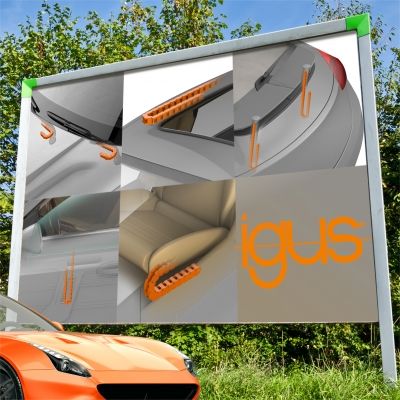Igus Demonstrates Safe Energy Chain Systems for New Automotive Trends
The rising demand for permanently energized systems calls for energy chain solutions that guide cables safely
According to a Forsa survey, one in three drivers spends over an hour in the car on any given business day. Due to the rise in automotive use, this trend will continue to increase in the coming years. Requirements for vehicle equipment are advancing, which means there will also be an increase in vehicle electrification. Trends for the automotive future, such as autonomous driving and e-mobility, will also require more and more cables, as well as the need for safe and lightweight energy supply systems.
New stress on electronic systems through car sharing
Electronic systems used in modern automobiles have to keep up with the latest standards. In the globally growing car sharing concept, for instance, the door must be locked autonomously by means of a chip prior to each drive. The requirements for autonomous door systems are therefore increasing from the standard 200,000 opening and closing cycles to 500,000 cycles. The number of seat and mirror adjustments per day also increases during car sharing, which puts stress on the energy systems. Therefore, a failsafe and long-lasting guidance of cables moving in very small spaces is required. It is here that using energy chains from igus is optimal. The high-performance plastic from which they are made ensures that they are not only corrosion-resistance and self-lubricating, but also very lightweight. They protect and guide cables safely at extreme temperatures as well. The wear resistance of the igus e-chains proved successful in the Arizona sand test, where the dirt sensitivity of components was examined.
E-chain E2 micro: The solution for moving permanently energized systems
At the IAA, Igus will be showing, among other products, the e-chain E2 micro in Hall 4, Stand E23. This e-chain is specially designed for minimal installation spaces and is already being used in electric sliding doors. Available in various sizes for a wide range of automotive application scenarios, from the windshield wiper to the tailgate, the E2 micro is optimally suited to ensure energy and signal supply lines are safely installed. It is the smallest plastic energy chain in the world, with a size of 4.5 millimeters, making it suitable for the most confined spaces. The e-chains from the E2C.10 and E2C.15 series made from the high-performance igumid G are resistant to temperatures of -104 degrees Fahrenheit up to 176 degrees Fahrenheit, and can implement accelerations of up to 3 m/s2. With its small pitch, the E2 micro ensures quiet running, and the relatively large connecting pins between the chain links provide a long service life. Due to their light weight, their use is particularly suitable for highly dynamic applications.




